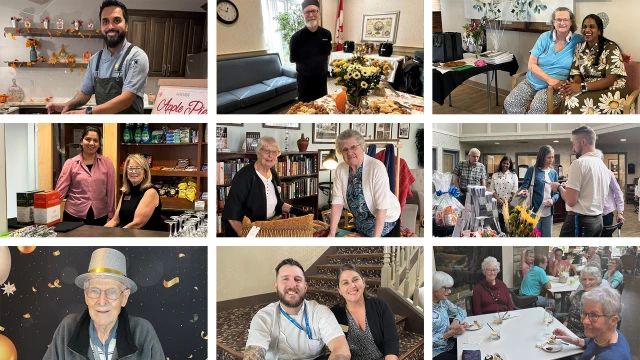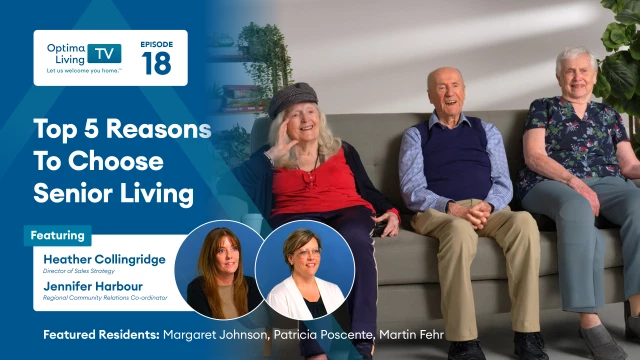Change brings new opportunities to grow, explore, and live with purpose. Your senior years can be a time of joy, creativity, and connection, shaped by your choices and what matters most to you. At Optima Living, we see ageing as a celebration of experience and possibility. A chance to create a life that feels vibrant, fulfilling, and truly your own. This article explores how thoughtful planning can help you continue living with confidence and meaning at every stage of care.
If you live in British Columbia, Seniors First BC offers a wide array of province-wide supports like legal help, advocacy, information services, and community programs to help older adults stay informed and empowered in daily life. In Alberta, the provincial government maintains a portal of supports and services aimed at helping seniors age in place—with tools on housing, social services, and safety—so you don’t have to navigate the journey alone.
What you’ll learn in this guide:
Ways to stay socially, culturally, and intellectually engaged
What to look for in living environments that support your evolving needs
How to nurture purpose and contribution, whatever your abilities
1. Start with your vision: what does “living well” feel like?
Planning for the future isn’t about what you might lose. It’s about everything you can gain: more freedom, more peace of mind, and more time to enjoy what truly matters.
Envision a typical day five or ten years from now. What does it include? Quiet mornings with tea? Hosting grandchildren? Pursuing new creative passions?
What gives you energy, joy, or peace now that you’ll want to keep?
What does connection look like for you? close friends, family, new relationships?
By anchoring your future to these values, every decision (from finances to location) becomes not a sacrifice, but a means to a richer life.
2. Build a financial foundation that supports options
One of the greatest gifts you can give yourself is financial clarity. As lifespans extend, we need to make our resources work harder and longer.
Take stock: pensions, RRSPs, TFSAs, savings, investments, and if applicable, sale of real estate.
Estimate what your desired lifestyle might cost. Include travel, hobbies, transportation, and social life.
Consider a buffer for health changes and increased supports later.
Explore how senior living options are financed in Canada.
Work with a trusted financial planner who understands the senior-living sector in Canada.
A strong financial foundation isn’t about perpetual abundance, It’s about confidence, flexibility, and peace of mind. The Government of Canada offers clear explanations of public pension options like CPP and OAS, plus tools to assess when to begin drawing benefits.
3. Holistic wellness: mind, body, spirit
Wellness in your senior years is not one-dimensional. To thrive, it must include physical, cognitive, emotional, and spiritual health.
Physical health
Engage in movement—walking, gentle strength programs, water-based exercise. These help maintain mobility, balance, and vitality.
Stay current with preventive care and screenings.
Honour nutrition: balanced, colourful, and suited to your metabolic needs.
Cognitive & emotional well-being
Keep learning: new languages, technology, art, or writing.
Embrace creativity—painting, music, crafts—to balance logic and expression.
Practice mindfulness, meditation, or journaling to nurture emotional stability.
Spiritual or existential well-being
Reflect on what gives you meaning. It may be faith, philosophy, community, or legacy.
Consider volunteering or mentoring—not just as an “extra,” but as a core part of your purpose.
Connect to nature, beauty, or silence as restorative practices.
When these dimensions support one another, you build resilience and adaptability—especially during health transitions or changes in care needs.
4. Cultivate a rich social and cultural life
No matter your care level, your inner world expands when your outer world stays active. Social connection and cultural engagement are not luxuries — they are core to mental health and longevity.
Join or lead clubs around books, film, writing, or crafts.
Attend concerts, gallery openings, lectures, or local festivals.
Volunteer in intergenerational programs—reading, mentoring, tutoring.
Use technology to keep long-distance relationships vibrant (video calls, shared photo albums, virtual classes).
For those in assisted or memory care, structured group programming can include storytelling, music therapy, group walks, or shared meals with themes.
Strong social ties have been linked to lower rates of depression, cardiovascular risk, and cognitive decline. (Harvard and other institutions reinforce that maintaining close relationships is protective.)
5. Choosing where and how you live
Your living environment can either limit you or enable you. As needs evolve, flexibility becomes gold.
Key design principles to look for
Scalable support: The ability to transition from independent to assisted to memory care within the same community, so you don’t have to uproot entirely.
Options and control: Meal plans, housekeeping, transport, and care services should be flexible—not rigid.
Accessibility and safety: Wide doorways, zero-step showers, well-lit corridors, emergency call systems.
Community design: Shared greenspace, gathering areas, workshops, gardens—all encourage connection.
Location matters: Proximity to health services, transit, culture, and nature enhance your ability to stay engaged with the wider world.
For a more comprehensive framework, the Canadian Institute of Retirement Options (CIRO) publishes a detailed guide to help seniors plan for lifestyle, finances, and care transitions, especially useful when comparing housing or community options.
6. Purpose in every stage: contribution and growth
Even in years of increased care, your ability to contribute matters. Purpose is a potent source of meaning, dignity, and joy.
Volunteer in ways suited to your energy: virtual mentoring, phone check-ins, writing letters, or offering guidance.
Lead a small group or resident club—book circle, knitting, memoir sharing.
Share your professional/craft knowledge with younger learners or community groups.
Teach or guide—whether it’s language sessions, gardening workshops, music lessons.
Work on a personal project: family history, photo archiving, a small creative work.
Having a role—to lead, teach, uplift—transforms ageing from passive to active. It speaks volumes about identity, not just dependency.
7. Planning your legacy: beyond estate planning
Legacy isn’t just about what you leave behind financially—it’s also about the stories, values, and connections you pass forward.
Reflect on:
What life lessons or stories do you most want your children, grandchildren, or community to remember?
Are there traditions, recipes, languages, crafts, or cultural practices you can preserve or teach?
How might you support a cause you care about—mentorship programs, scholarships, community grants?
How would you like people to speak of you in 20 or 30 years?
By weaving these reflections into how you live today, your legacy isn’t distant—it becomes woven into everyday life.

8. Moving from planning to action
Vision without action fades. Here's how to begin:
Create a “senior living plan” document: your vision, values, financial picture, desired care features, volunteer ideas, and legacy aspirations.
Schedule regular reviews—every year or after any major life event. Adjust as needed.
Engage advisers who understand the sector—financial planners with senior-living insight, eldercare consultants, and community managers.
Talk it through with family or trusted friends—shared insight can enliven your plans and build support.
Take small steps now—join a class you’ve imagined, volunteer once, visit community models, or start writing that memoir.
Each step builds momentum; over time, your plan becomes your lived reality.
Designing your senior years is not about limiting possibilities. It’s about expanding them. At Optima Living, we view each resident as a co-designer of their life’s next season. Whether you're independent, receiving support, or living in memory care, your values, passions, and purpose still matter deeply.
Continue your journey here
Looking to take the next step or simply stay connected? Here are a few helpful links:
Contact us – We’re happy to answer any questions you may have.
Book a tour – Come experience our community in person.
Subscribe to our newsletter – Get updates, stories, and helpful tips delivered to your inbox.
Visit our YouTube channel – See daily life, special moments, expert interviews and resident stories in action.
About Optima Living
Optima Living is a trusted community of senior living residences across Western Canada, with over 15 years of commitment to creating home-style living rooted in respect, dignity, and purpose. With a range of independent, assisted, memory living and long-term care options and a heartfelt commitment to our North Star “Let us welcome you home,” Optima Living empowers seniors to thrive in a caring environment where personal choice, meaningful connections, and well-being come first.


